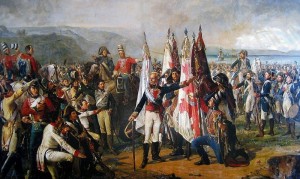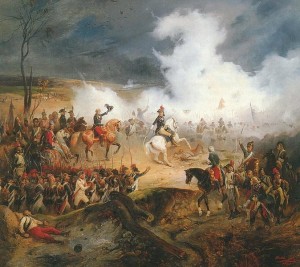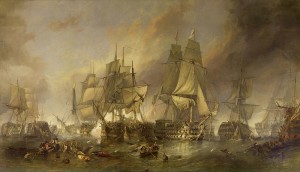For a good portion of the Regency Era (and for the last decade of the 18th Century),  England and France found themselves at war.
England and France found themselves at war.
Again.
War was hardly a new thing for either country. With past wars between England and France, greed, land acquisition, and strengthening the monarchy were the usual catalysts and goals. But with the advent of the French Revolution (and the American Revolution preceding it), a new mentality regarding war arose among the common people.
Before the American and French Revolutions, commoners fought in wars that served to benefit the aristocracy or monarchy. With these new revolutions, regular citizens and common people had a better reason to fight: themselves. Each man standing in France’s army believed he would have a better life if he was allowed to choose who governed his country, rather than be subject to a hereditary monarch.
One thing that the British initially failed to understand about the French and Americans was WHY they wanted to fight. If you study the French Revolution, American Revolution, Napoleonic War and then the War of 1812, you’ll find this misunderstanding for every single war. With the changes in the French and American governments came a type of energy and belief that the mass of the population could fight for freedom, or for a government they wanted rather than one handed to them by a monarch. And Britain failed to grasp these ideals.
 If you were to ask a Frenchman in 1793 and 1803 why he fought, he would have given an answer that involved something about freedom and thwarting tyranny. Even if you were to ask this question a decade later in 1813, after twenty years of war, the answer may well have been the same. “We want freedom. We don’t want another Bourbon king.”
If you were to ask a Frenchman in 1793 and 1803 why he fought, he would have given an answer that involved something about freedom and thwarting tyranny. Even if you were to ask this question a decade later in 1813, after twenty years of war, the answer may well have been the same. “We want freedom. We don’t want another Bourbon king.”
Interestingly enough, if you were to ask a British subject in 1793 why he fought, he likely would have answered “because the king wants us to fight.” If you were to ask the same British soldier that question in 1803, his answer might well be the same, or he might say something to the effect of “because I don’t trust that French Consulate and Napoleon.” If you were to ask the same question again in 1813, the answer would likely be, “Because that Corsican Monster Napoleon is trying to take over Europe, and he’ll take England if we don’t stop him.”
For the first decade of war between France and England, the average British sailor and  soldier didn’t have a reason to fight beyond “the government wants us to.” The average Englishman had nothing to gain by fighting with France until the English populace began to believe Napoleon Bonaparte a threat to England (part of which was came about as a result of printing intentionally untrue propaganda against Napoleon). And only then did Britain truly begin to best France in battle.
soldier didn’t have a reason to fight beyond “the government wants us to.” The average Englishman had nothing to gain by fighting with France until the English populace began to believe Napoleon Bonaparte a threat to England (part of which was came about as a result of printing intentionally untrue propaganda against Napoleon). And only then did Britain truly begin to best France in battle.
Now I’m curious about your views. Do you think Britain misunderstood the motivation of both the French and American people when they went to war? Do you think some of that misunderstanding is what led to two decades of war between Britain and France, and the United States defeating Britain two different times? When you look at the French Revolution and Napoleonic War, do you believe the French people had a reason to fight? Do you believe the British people had a reason to fight?
Originally posted 2013-06-24 10:00:30.
Comments are closed.